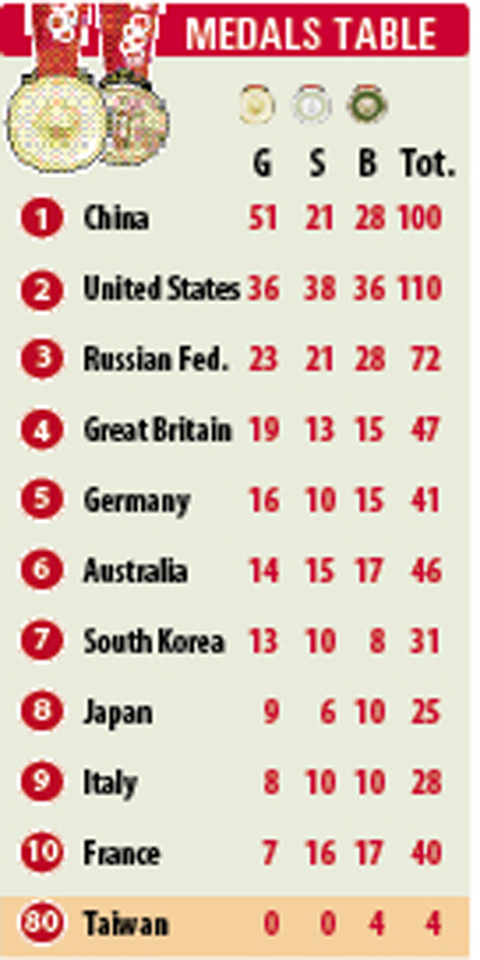International Olympic Committee (IOC) president Jacques Rogge said the Beijing Olympics succeeded in opening up China but stressed it was never the sports body’s role to force social and political change on the Communist giant.
“It has been a long journey since our decision in July 2001 to bring the Olympic Games to China, but there can now be no doubt that we made the right choice,” Rogge said yesterday on the final day of the Games.
The Olympics, he said, had brought unprecedented global scrutiny to the emerging superpower with one-fifth of the world’s population.

“The world has learned about China, and China has learned about the world and I believe this is something that will have positive effects for the long term,” Rogge said.
Despite the grand success of the Beijing Games in terms of organization, sports venues and athletic performances, the IOC has been accused of failing to get China to live up to promises of improvements in human rights and press freedoms.
“We are first and foremost an organization devoted to sport, but it is sport with a purpose,” Rogge said in a speech to the IOC General Assembly.
“The IOC and the Olympic Games cannot force changes on sovereign nations or solve all the ills of the world. But we can, and we do, contribute to positive change through sport,” he said.
Rogge said the Olympics were leaving China with a long-term legacy of sporting facilities, improved urban infrastructure and greater environmental awareness.
“Some of the changes in China are obvious today,” he said.
“Others will become apparent with time. The legacy of these Games for China is ultimately up to the Chinese people,” he said.
Rogge acknowledged that not everything was “perfect” for media access to the Internet during the Beijing Games, and expressed surprise that no citizen protest permits had been granted.
While Olympics organizers promised to set aside three protest zones in the city during the competition, authorities said all of the 77 applications for permits to protest were either withdrawn or rejected.

MORE VISITORS: The Tourism Administration said that it is seeing positive prospects in its efforts to expand the tourism market in North America and Europe Taiwan has been ranked as the cheapest place in the world to travel to this year, based on a list recommended by NerdWallet. The San Francisco-based personal finance company said that Taiwan topped the list of 16 nations it chose for budget travelers because US tourists do not need visas and travelers can easily have a good meal for less than US$10. A bus ride in Taipei costs just under US$0.50, while subway rides start at US$0.60, the firm said, adding that public transportation in Taiwan is easy to navigate. The firm also called Taiwan a “food lover’s paradise,” citing inexpensive breakfast stalls

TRADE: A mandatory declaration of origin for manufactured goods bound for the US is to take effect on May 7 to block China from exploiting Taiwan’s trade channels All products manufactured in Taiwan and exported to the US must include a signed declaration of origin starting on May 7, the Bureau of Foreign Trade announced yesterday. US President Donald Trump on April 2 imposed a 32 percent tariff on imports from Taiwan, but one week later announced a 90-day pause on its implementation. However, a universal 10 percent tariff was immediately applied to most imports from around the world. On April 12, the Trump administration further exempted computers, smartphones and semiconductors from the new tariffs. In response, President William Lai’s (賴清德) administration has introduced a series of countermeasures to support affected

CROSS-STRAIT: The vast majority of Taiwanese support maintaining the ‘status quo,’ while concern is rising about Beijing’s influence operations More than eight out of 10 Taiwanese reject Beijing’s “one country, two systems” framework for cross-strait relations, according to a survey released by the Mainland Affairs Council (MAC) on Thursday. The MAC’s latest quarterly survey found that 84.4 percent of respondents opposed Beijing’s “one country, two systems” formula for handling cross-strait relations — a figure consistent with past polling. Over the past three years, opposition to the framework has remained high, ranging from a low of 83.6 percent in April 2023 to a peak of 89.6 percent in April last year. In the most recent poll, 82.5 percent also rejected China’s

PLUGGING HOLES: The amendments would bring the legislation in line with systems found in other countries such as Japan and the US, Legislator Chen Kuan-ting said Democratic Progressive Party (DPP) Legislator Chen Kuan-ting (陳冠廷) has proposed amending national security legislation amid a spate of espionage cases. Potential gaps in security vetting procedures for personnel with access to sensitive information prompted him to propose the amendments, which would introduce changes to Article 14 of the Classified National Security Information Protection Act (國家機密保護法), Chen said yesterday. The proposal, which aims to enhance interagency vetting procedures and reduce the risk of classified information leaks, would establish a comprehensive security clearance system in Taiwan, he said. The amendment would require character and loyalty checks for civil servants and intelligence personnel prior to